SEO Services for Divorce Lawyers & Law Firms
When implemented correctly, SEO helps divorce law firms reach more potential clients, generate stronger leads, and stay competitive in a crowded market.
Yes, AI and ever-shifting Google algorithms complicate the landscape. But proven, strategic SEO that’s tailored specifically to your law firm can drive measurable results. In this guide, we’re cutting through generic advice. You’ll learn how to apply SEO that works for law firms. No fluff. Just strategies designed to elevate your divorce practice.
Does SEO really work for divorce firms?
Whether someone needs a new dentist or a reliable mechanic, their search usually starts the same way: online. Divorce law is no different. In fact, the query “divorce lawyer” averages 28,000 monthly searches nationwide. Other users search using more specific modifiers like “best divorce lawyer” (1.6k per month) or “divorce lawyer near me” (a search volume of 14k per month).
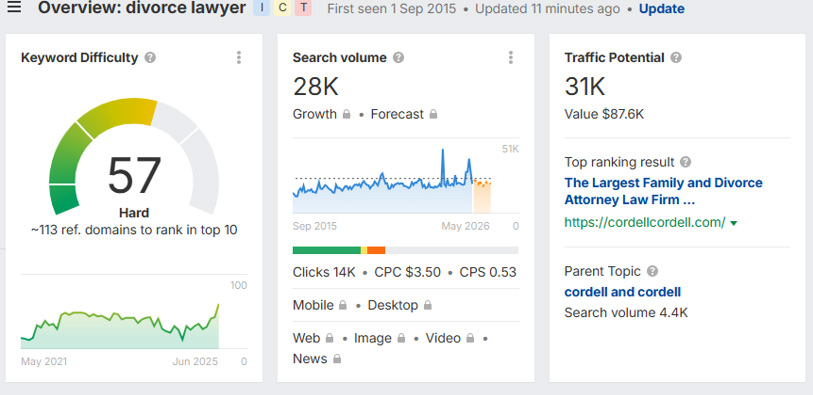
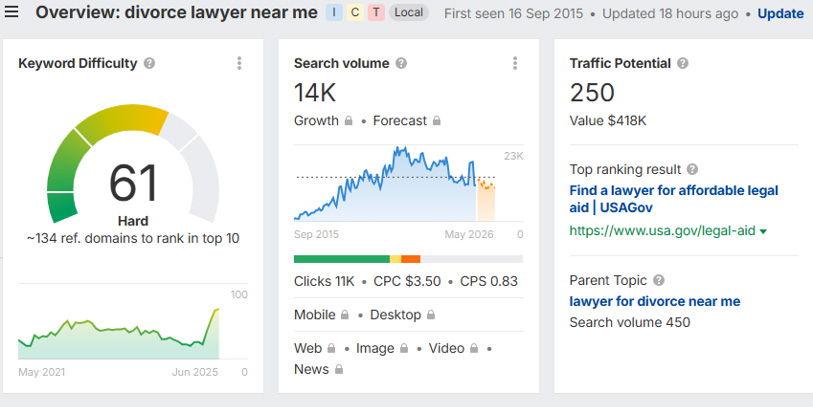
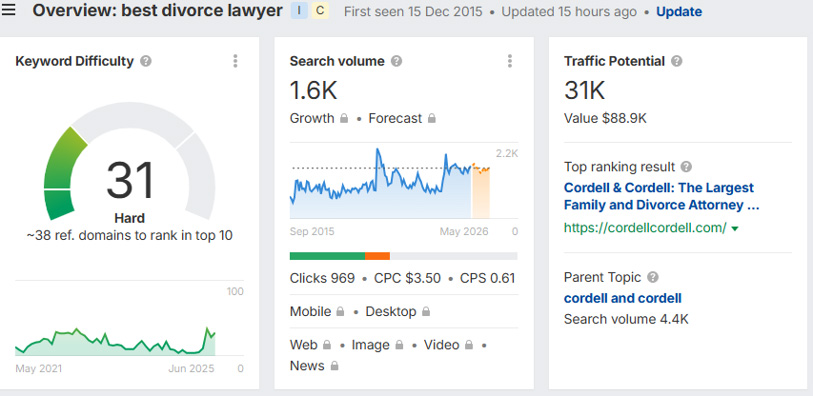
And then there are the thousands of geo-located queries people search every month. “Chicago divorce lawyer” sees around 500 searches each month, while “Oak Park divorce lawyer” draws just ten.
What’s the smart move? It depends. When you’re a smaller firm or haven’t built up your domain authority, it can be challenging to rank for Chicago (or any big city, for that matter) queries. But if you’re a small practice based in Oak Park, for example, you want those 10 people looking for a local attorney to find you because it’s much more manageable than targeting more competitive Chicago queries.
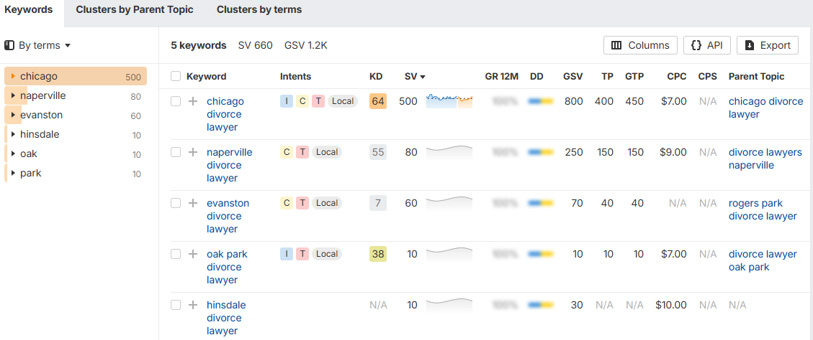
When done right, SEO connects you with clients. But it’s not about stuffing your site with keywords and hoping for the best. Ranking well takes strategy. The real power of SEO lies in targeting the right audience with content that speaks directly to their needs. That’s how you rise in the rankings and stay there.
Your competitors probably use SEO
The divorce attorneys winning clients online are investing in SEO. They’re auditing their site (and probably yours, too) to identify technical problems, link opportunities, underperforming content, and topic gaps that need to be filled.
Then, they implement fixes or strategies from their audits.
- They’re writing fresh, targeted content that’s genuinely useful, builds authority in the divorce law space, and speaks to each local market.
- They’re building a local SEO strategy that includes local content, Google Business Profile maintenance, and possibly local service ads (LSAs).
- They’re implementing responsive design that works seamlessly on both mobile and desktop, with pages that are easy to read and visually engaging.
- They’re prioritizing strong technical SEO, including logical site architecture and URL structure, speed improvements, and smart structured data (schema).
- They’re optimizing for conversion, featuring clear calls to action, prominent contact forms, and trust signals like case results, awards, and client reviews.
A modern, high-performing SEO strategy plans for more than traditional organic results. Visibility comes from multiple channels:
- Local map packs: These location-based results highlight local firms near the searcher. Client reviews, high-quality images, and other GBP fundamentals are essential to appearing in the map packs.
- AI Overviews (AIOs): Google now provides AI-generated summaries at the top of many search pages, pulling from trusted sources.

- AI Mode: Google’s newest AI-powered search feature, AI Mode, is similar to chatbots like ChatGPT, allowing for more conversational search.
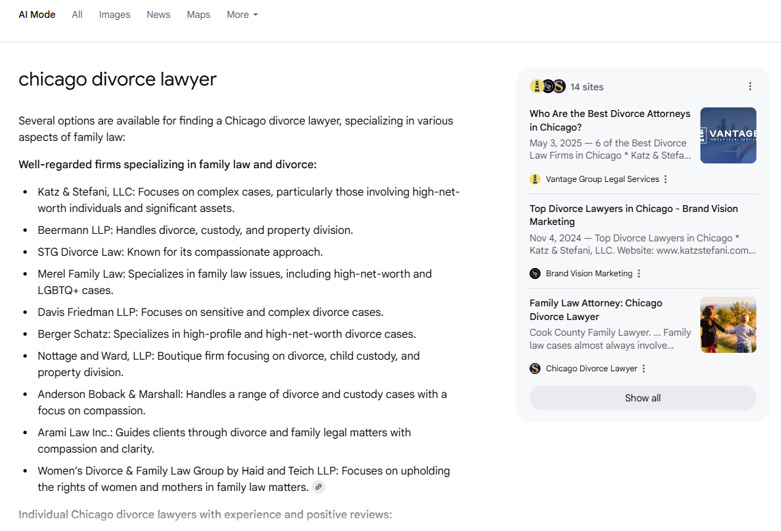
Search behavior is evolving. Increasingly, users are turning to AI tools for answers, often bypassing traditional search engines entirely. Many of the same strategies and quality standards that work for traditional SEO appear to be relevant to being seen in the AI Overviews and other AI features. But even as search and search behaviors evolve, build a strategy that’s adaptable but grounded in building trust with users.
Off-page SEO tactics for divorce lawyers
Strong on-page SEO is just one piece of the puzzle. To truly boost visibility, build your firm’s credibility beyond your website.
Create and maintain Google Business Profiles (GBP) for each of your offices. If there’s an unclaimed listing for your firm, claim it. Ensure your name, address, and phone number are accurate. Write a brief description of your firm. List your services. Set your hours. Add quality images of your office, staff, and attorneys.
Most importantly, encourage satisfied clients to leave Google reviews. Social proof builds trust and improves local SEO. And divorce firms with high ratings and many client reviews tend to perform better in the Google map packs.
Also, audit your competitors’ and your backlinks and create a strategy to acquire links from relevant and reputable websites. When reputable sites link to your content, it signals authority and could even drive traffic. Create valuable, original resources that others want to reference and link to, build citations with local and legal directories, and do some outreach to acquire links within your community and industry.
When your SEO extends beyond your site, it can significantly affect your local search and domain authority.
Creating a strategy unique to your divorce firm
One-size-fits-all SEO doesn’t work. Think of it like spousal support. Orders for spousal support vary depending on several variables, including lifestyle, income, and unique circumstances. Your SEO strategy should be no different. It must reflect your firm’s goals, niche practice areas, and location. It should also account for where your website is now (e.g., a small site with few pages and low domain authority vs. an established site with hundreds of pages and high domain authority).
Tailor your strategy to your divorce firm
Maybe you’ve set ambitious goals like signing a specific number of new clients by year-end. Or maybe you want to target more specific case types, such as uncontested divorces. Maybe you’re just looking to gain a foothold in your immediate local area before you expand to larger markets nearby.
Clear goals guide your SEO strategy so it’s built to deliver results that matter to you.
For example, if your firm’s website is relatively new, has a dozen pages and a few blog posts, and a smattering of backlinks, only some of which are relevant to your market and practice, you likely lack the domain authority to really compete in the major markets. Your strategy might first prioritize the low-hanging fruit: acquiring local citations, building out your Google Business Profile, shoring up the technical fundamentals and Core Web Vitals, and initial content builds in your local market.
From there, your SEO plan might move into building authority with new links and broadening content beyond transactional pages. For example, building a solid foundation of FAQ pages that answer common search questions potential clients have, such as what a divorce petition is, how debts are divided in a divorce, or state-specific divorce questions.
That stands in contrast to SEO for a divorce firm whose website is more established. The SEO plan might first call for auditing and shoring up tech fixes and fixing structural and site architecture problems. A content audit might reveal pages close to ranking in the top 5 or top 3. And a backlink audit might reveal gettable links that their competitors have that they don’t. The plan might then call for expanding content to target new practice areas (e.g., custody, spousal support, etc.), creating GBPs for new offices, and pushing linkbuilding to improve domain authority as they enter those new markets.
Bottom line: create a plan that works for your divorce firm. Don’t settle for SEO plans that offer cookie-cutter solutions that fail to account for where you are and where you want to go.
Create helpful content that highlights your “why”
Write legal content for your website that’s helpful to users, addresses their needs, and sets your firm apart.
Effective content (that is, content that performs well in search but also converts users into leads) starts with clarity. Specifically, clarity about who you are, who you serve, and why you’re best equipped to help them.
First, understand your audience. Who are they, what are their needs, and what are they searching? Build a targeted content plan that reflects your services and markets but that’s tailored to queries that give your firm the best chance to gain visibility in the SERPs.
As you write content for your website, understand and reflect your firm’s “why.” That is, the reason you exist, the reason you do what you do, and, ultimately, the reason clients choose your firm over any other to handle their divorce case. Offer insight based on your experience. Explain challenges. Be helpful and engaging, and speak to your value proposition to set your firm apart.
If you’re mass-producing generic content, you’re failing to stand out. Bland content could hold you back in the rankings or at least fail to entice users who visit your site. (Want help defining that core message? Learn more about how to uncover your firm’s “why” here.)
What to expect from an SEO agency
You wouldn’t trust someone without a law degree to represent you, so why trust your SEO to guesswork? Some firms handle SEO on their own, only to miss opportunities. When you partner with a professional SEO agency, you’re working with a team that knows how to optimize websites for results.
Here’s what we bring to the table:
Proven SEO strategies backed by 15+ years of experience
For over 15 years, we’ve helped law firms nationwide with strategies that drive real results.
Dedicated support from day one
You’ll be matched with a dedicated account manager from the moment you join us. We take time to understand your firm’s unique goals and challenges, then build a custom strategy to match. Your account manager keeps you informed, answers your questions, and ensures your priorities stay front and center.
Monthly strategy calls that keep you in the know
You can reach your account manager at any time, but our monthly calls are where the bigger picture comes into focus. Each month, we walk you through your progress: what’s working, where you’re gaining, and what we’re adjusting to keep your momentum strong. No guesswork. Just full transparency on how your site is performing and where we’re headed next.
Ready to take the next step?
When you partner with We Do Web, you tap into years of proven SEO expertise, built specifically for law firms. We don’t do generic strategies. We craft tailored plans and content that align with your goals, your market, and your strengths.
Ready to see what’s possible? Reach out today for your free site audit.
